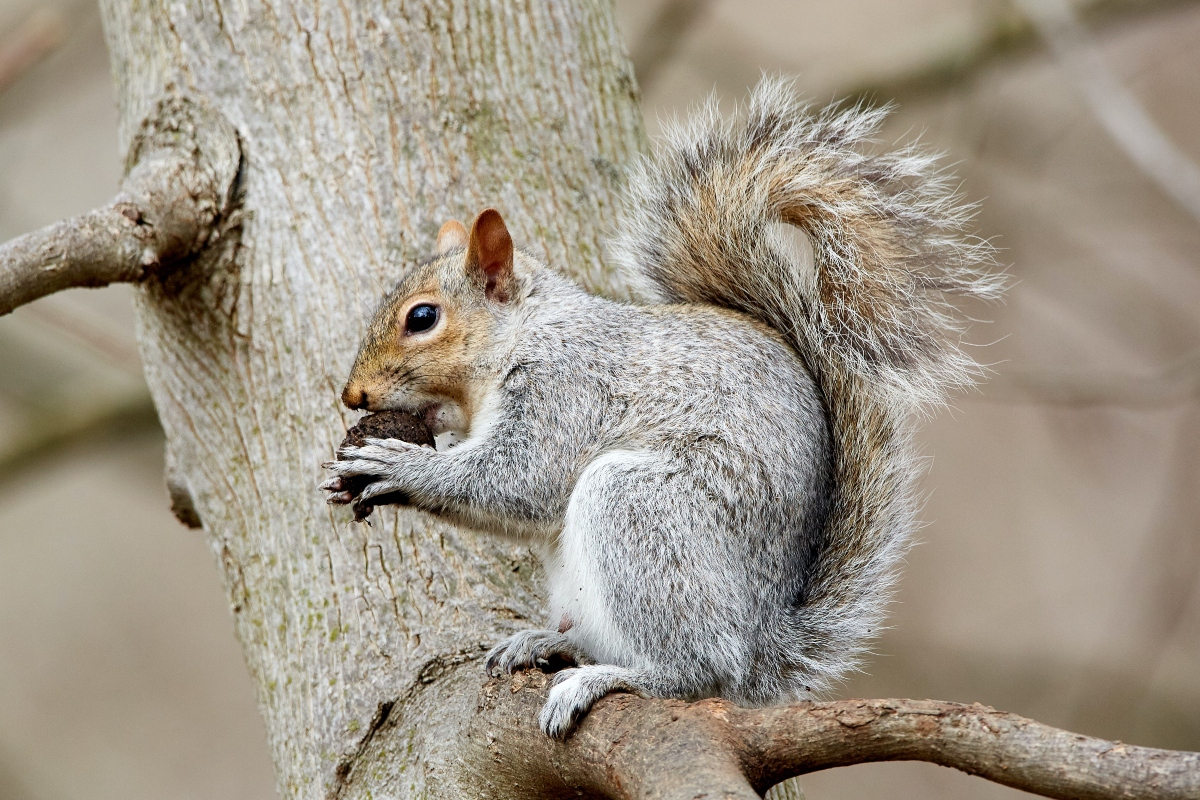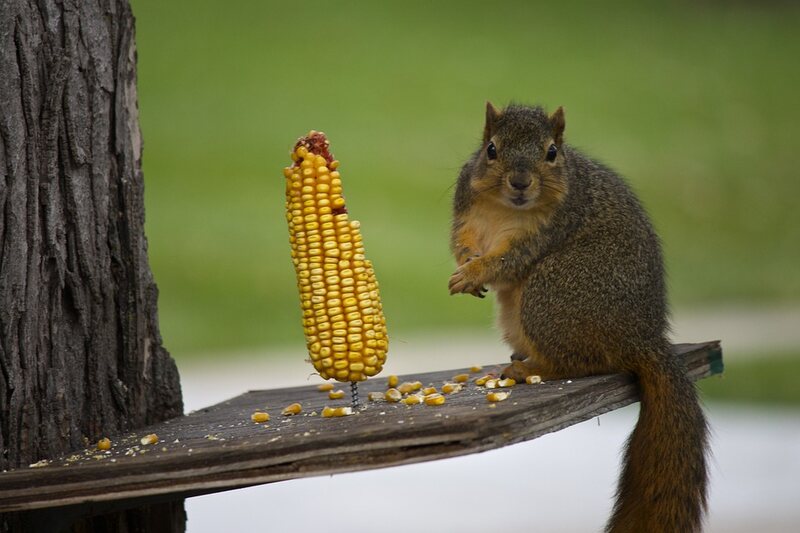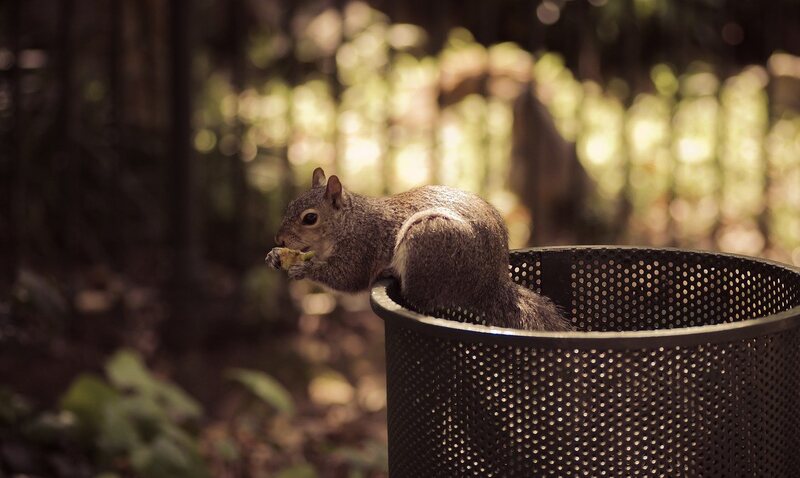
How can you get rid of squirrels on your lawn? There are three main ways: Make your yard less inviting (aka habitat modification), trapping, repellants, or try a mix of all four.
Let’s walk through the options mentioned above.
1. Make Your Yard Less Inviting to Squirrels

Limit access to food and water for squirrels to make your yard less attractive as a gathering place and foraging space.
- Trim overhanging tree branches to prevent them from reaching your home.
- Cover trash cans with a tight lid or keep them in a secure location.
- Rake up fallen acorns, fruit, or seeds from around bird feeders and trees.
- Remove standing water from dripping faucets, holes in your yard, or anywhere water accumulates after rain. Empty bird baths until you’ve solved your squirrel problem.
- Install squirrel baffles on your bird feeder post to keep away squirrels. Place bird feeders away from your home or trees that squirrels can jump from or buy squirrel-proof bird feeders.
- Feed squirrels — away from your yard. Set up a squirrel feeding station (a basket of assorted nuts) at the edge of your property, so these animals will congregate there, rather than near your home and garden.
2. Apply Squirrel Repellents

Squirrel repellents are another option. These range from spraying squirrels with water from a hose or sprinkler, getting a pet to chase them (or a plastic owl to scare them), to dusting your plants or spraying them with deterrents, to growing plants that squirrels don’t like because of their scents.
Natural and DIY squirrel repellents
- Spray water on squirrels. The easy, cheap way to scare off squirrels off to squirt them with water a hose. You can also install a motion-activated sprinkler system to keep squirrels at bay.
- Get a pet, even if it’s a plastic one. A dog or cat may enjoy chasing squirrels out of your yard, and a plastic owl installed in a high place like your roof or on a tall post can keep squirrels at bay.
- Treat your plants with squirrel deterrents, like bulbs and flowers, with a mixture of cayenne pepper, red pepper flakes, paprika, or other spices around the base of your plants. After it rains, reapply. Add this squirrel deterrent mixture to your bird seed. The birds won’t taste it, but the squirrels will. Store-bought capsaicin sprays are also available. Note: Do not use repellents on the fruits and vegetables you intend to eat.
- Grow plants squirrels don’t like: These include allium, daffodils, and garlic.
Chemical squirrel repellents
Consider applying store-bought squirrel repellents around plants and near potential entry areas of your home. Squirrel repellents come in spray or granular form and are often made with thiram, a fungicide.
3. Trap Squirrels Stuck in Your House
You should only trap squirrels that have made their way into your home since outside is where they belong. Here’s how to do trap squirrels stuck inside your home:
- Choose your trap: One- or two-door live trap cages are the two humane trapping options available.
- Place your trap: Good locations are in front of entry points, in the attic, or in the crawl spaces of your home. Check the traps twice a day, especially in attics where heat can kill squirrels stuck in your home.
- Bait your trap: The PennState Extension suggests using nuts, peanut butter, or slices of oranges and apples as squirrel bait.
- Empty your trap: After trapping one (or several) squirrels, release them back into your yard. The Humane Society says that relocating wild animals isn’t always the best option as the animal is likely to die. If you don’t want them on your property, contact a local wildlife professional to remove them.
- Protect your home: Follow up with exclusion measures to ensure these rodents can’t break in again.
Why You Should Control Squirrels
Why would you want to get rid of these bushy-tailed creatures in the first place? They seem harmless enough, scurrying about outside feasting on fallen acorns or sprawling across tree limbs to reach buds and seeds.
Problems arise when these squirrels invite themselves to:
- Eat your food from the vegetable garden or bird feeder
- Dig up your lawn in search of nuts or to bury food for later
- Nest in your attic or crawlspace and chew your wires
“In residential areas, squirrels cause damage because of their tendency to gnaw on structures. They will chew siding and under eaves to make openings for their nests,” the PennState Extension explains.
“Once they have made a nest, squirrels will chew on insulation [and] wires. This habit is dangerous because the bare wires may cause a fire. They also travel along power lines and may short out transformers.”
FAQ
Not usually. While many home insurance policies cover damage from wildlife, most insurers don’t cover squirrel damage because it’s viewed as avoidable.
Squirrels can carry salmonella and other potentially hazardous diseases, but transmission to humans isn’t verified. According to the Humane Society, no human has ever contracted rabies from a squirrel.
Not really. Rodents, like squirrels, stopped responding to ultrasonic sounds after only a few days of exposure, according to pest control experts.
If you’re considering purchasing this type of product, do your homework on businesses beforehand, and buy from one with a high reputation. Keep in mind, though, that many people in the pest control business claim that they are ineffective.
When to Call a Pest Control Professional
Overwhelmed at the thought of tackling your squirrel problem all on your own? Enlist the expertise of a local pest control pro. Armed with years of experience, these folks will evaluate your home and yard to develop a plan that will help end your squirrel problems once and for all.
Main Photo: Mathew Schwartz / Unsplash